Trans-Siberian No.3 Part 2: Moscow - Lake Baikal - Vladivostok
Tuesday 11th July
We arrived at Yaroslavskiy station in good time, and our train was not yet
shown on the departure indicators. As we waited we saw a train of red, blue
and white coaches being shunted into one platform, and as these are the colours
of the Russian flag it was obvious that this was our train, the "Rossiya".
We would be on the train for four nights, as far as Irkutsk.
 When we first boarded, the train was stiflingly hot, as it had clearly been
left in the sun without the air conditioning working. We dumped our luggage
in our compartment and returned to the platform. I went to a kiosk to stock
up on bottles of beer and water. The weekly Chinese train to Beijing was also
in the station, which brought back memories of 1997 for Bill and me. We re-boarded
our train, and it departed on time at 21.25. A packaged meal of burger, nibbed
wheat, sweetcorn and peas was handed to us shortly after departure, which we
weren't expecting. We ate it, despite not really being hungry. We stayed up
until the first locomotive change at Vladimir, just after midnight, where our
ChS7 class locomotive (3kV d.c.) was replaced by a ChS4T (25kV a.c.).
When we first boarded, the train was stiflingly hot, as it had clearly been
left in the sun without the air conditioning working. We dumped our luggage
in our compartment and returned to the platform. I went to a kiosk to stock
up on bottles of beer and water. The weekly Chinese train to Beijing was also
in the station, which brought back memories of 1997 for Bill and me. We re-boarded
our train, and it departed on time at 21.25. A packaged meal of burger, nibbed
wheat, sweetcorn and peas was handed to us shortly after departure, which we
weren't expecting. We ate it, despite not really being hungry. We stayed up
until the first locomotive change at Vladimir, just after midnight, where our
ChS7 class locomotive (3kV d.c.) was replaced by a ChS4T (25kV a.c.).
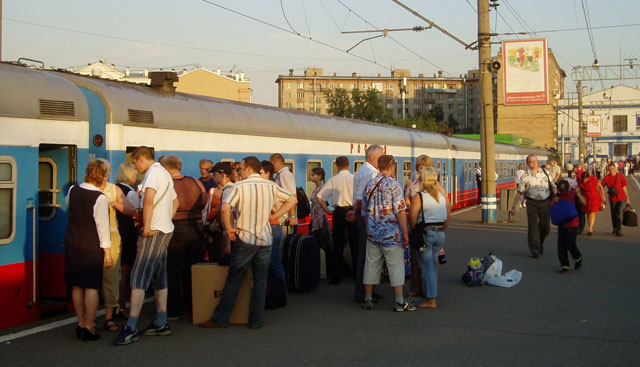
|
The "Rossiya" at Yaroslavkiy station in Moscow, before
leaving on its 7-day journey to Vladivostok
|
Wednesday 12th July
After a poor night's sleep, I got up at 8 o'clock Moscow Time, then put my
watch forward an hour as we had crossed into another time zone overnight. As
the railway uses Moscow Time, Tim kept his watch unaltered so that we could
check our progress against our printed copy of the timetable, obtained from
the internet before leaving home (we also had maps and guide books). One of
our daily rituals was to see where we were due to have long station stops during
the day: typically there would be 3 or 4 stops of 15 to 25 minutes, allowing
time to leave the train. The first such stop today was Kirov, not long after
we got up, so we duly got out to stretch our legs.
After the train restarted, we had a DIY breakfast of flapjacks and coffee.
A samovar (water boiler) on the train provides hot water for drinks, and we
had a plentiful supply of tea bags, coffee powder and packets of soup. We had
just finished this breakfast when our provodnitsa (carriage attendant)
Olga came round with breakfast packs containing crackers, salami, a wafer
biscuit and tea. I only had the biscuit.
When making our booking for the trip, we had effectively bought a fourth
ticket in order to get exclusive use of a 4-berth compartment, which meant that
our accommodation was less cramped than it might have been. Even so, there wasn't
a great deal of space, and the luggage storage areas (under the seats, or on
a shelf accessible from the top bunks) were not that easy to get at. It took
us a day or so to get our things organised so that frequently-required items
were easy to hand.
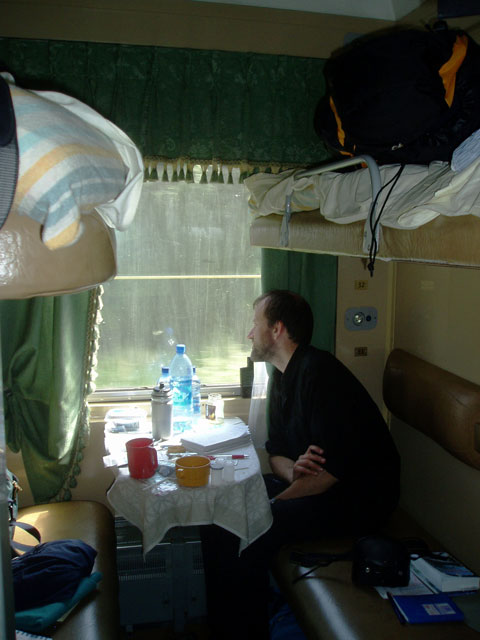
|
Our compartment in the train
|
I had brought some crosswords which I had cut out from newspapers before
leaving home, so Bill and I occupied the rest of the morning doing one from
the Times, which we failed to complete before lunch arrived. Lunch was not dissimilar
to last night's evening meal: a meatball with pasta, peas and sweetcorn, served
in a plastic container. Not very appetising, but it was free so we ate it.
My afternoon's activities consisted of a station stop (Balyezino), a
snooze, putting my watch forward another hour, listening to my iPod, and another
station stop (Perm).
None of us fancied another packed meal, so we went to the restaurant car
for dinner. I had quite a good meal of salad, fish & chips and Baltika beer,
for about 500 roubles (£10). A Uriah Heep video was playing loudly in the dining
car.
We returned to our compartment, finished the crossword, had a beer and listened
to some music. The train was now climbing in order to cross the Urals, and we
stayed up to see the obelisk which marked our entry into Asia (and Siberia)
shortly after midnight.
Thursday 13th July
Today's station stops were Ishim, Omsk, Barabinsk and Novosibirsk. The crossword
was from The Independent, and we finished it before lunch, but then again lunch
did not arrive until 15.50 local time (maybe Olga was sticking with Moscow Time).
Actually lunch was quite good today, being fish, rice, and the inevitable peas
and sweetcorn. Today we actually ate all four portions between the three of
us. Other highlights of the day included trying to take photographs of level
crossings (which have a rising section of roadway, no doubt very effective at
stopping traffic), and Olga going round with a vacuum cleaner. Two time zones
were crossed, so by the evening we were 4 hours ahead of Moscow.
We went to the restaurant car again for our evening meal, and it was there
that we learnt that no packed meal had been served last night. There were quite
a few foreign tourists on the train, mostly French or German, and most of them
were travelling to Irkutsk on this train and would continue later to China via
Mongolia.
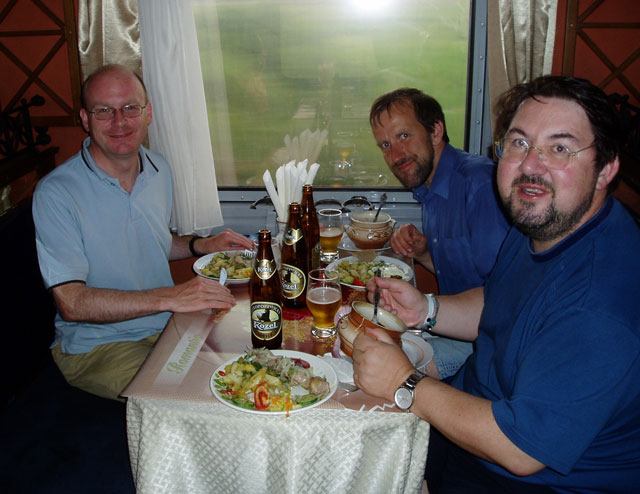
|
The three Brits in the restaurant car. Although the menu was
fairly limited, the food was quite good. On this particular evening,
I had solyanka (a type of soup, which was very tasty), then pork
escalope, chips (fries) and salad. We usually drank Russian
beer, but this evening they only had Kozel Czech beer.
|
Friday 14th July
Another full day of travelling through Siberia: today's main station stops
were Krasnoyarsk, Ilanskaya and Nizhneudinsk and there were some short stops
at smaller towns as well. We successfully completed another crossword.
At Krasnoyarsk we had time to go outside the station to see the impressive
communist-era mural on one side of the square. The station itself has been rebuilt
in the last few years, and seemed to provide plenty of facilities in an attractive
building. Also at Krasnoyarsk was a luxury tourist train, with "Trans-Siberian
Express" name boards. For a few extra thousand pounds we too could have
enjoyed the company of a load of British, German and American tourists.
Our breakfast packs (identical to the previous ones) arrived at 12.28, so
Olga was clearly still on Moscow time. She must have then put her watch forward,
as lunch arrived at 13.16. It was burger, pasta, peas and sweetcorn. We bought
ice creams for dessert at Ilanskaya station.
For dinner I had borscht, then "brisol" (pork with cheese,
onion and mushrooms). In the evening we got our luggage organised, ready for
leaving the train in the morning.

|
We found an open window where we were able to take some photos
towards the front of the train. This photo was taken at about 4600km
from Moscow, between Reshoti and Klyuchi.
|
Saturday 15th July
We were knocked up by our provodnitsa, Olga, at 6.15, which was 10 minutes
before we had set our alarms. The train arrived in Irkutsk on time at 7.11,
and we left the train here. We had arranged a road transfer to our hotel in
Listvyanka, and there was a young lady on the platform holding up a card with
our names. She introduced herself as Anya, and led us to a minibus and driver,
who took us to the Baikal Hotel, about an hour's drive from Irkutsk. We were
surprised to learn that we had the services of Anya and the minibus for the
rest of the day.
The Baikal Hotel was an unattractive concrete Soviet-era building, but the
rooms had been modernised and were very comfortable. After we had got ourselves
sorted we met Anya again, and she suggested a visit to the Taltsy Museum of
Wooden Architecture, which was a few km from Listvyanka on the road back to
Irkutsk. This was a collection of renovated or reconstructed traditional Siberian
buildings, forming a museum village.
We returned to Listvyanka for lunch, but before finding somewhere Bill realised
that he no longer had his digital camera with him, and thought he had probably
put it down somewhere while in the museum shop. So we charged off back down
the Irkutsk road in the minibus, and Bill was well pleased to retrieve his camera,
which had been handed in at the ticket office.
Returning once more to Listvyanka, we found a restaurant where we could sit
outside in the sunshine. Here, we enjoyed a meal which included omul,
a fish found only in Lake Baikal.
We had a look around the harbour area, then we were dropped off outside the
Limnological Museum, which was near the hotel. Limnological? I didn't know what
it meant either, but my dictionary defines limnology as "the scientific
study of conditions in bodies of fresh water (e.g. lakes)". The first part
of the museum was interesting for its dullness: wildlife specimens preserved
in formaldehyde, rock samples, and other displays with explanations only in
Russian. There was also an aquarium section, which included two nerpa (freshwater
seals) that would have been happier in the lake.
Instead of returning directly to the hotel, we decided to walk up the hill
behind, to a viewpoint overlooking Lake Baikal. The weather here was cooler
than we had experienced over the previous days, perhaps about 20C, and there
was a little mist over the lake.
Back at the hotel, Tim said that he had a headache and upset stomach, so
he did not want an evening meal. Bill and I decided to visit "Proshly Vek",
a restaurant we had seen earlier in the day. It was about a 25-minute walk,
but well worth it as we both had fish solyanka, a very tasty and filling fish
soup, as a main course. This was followed by ice cream with nuts and chocolate
sauce.
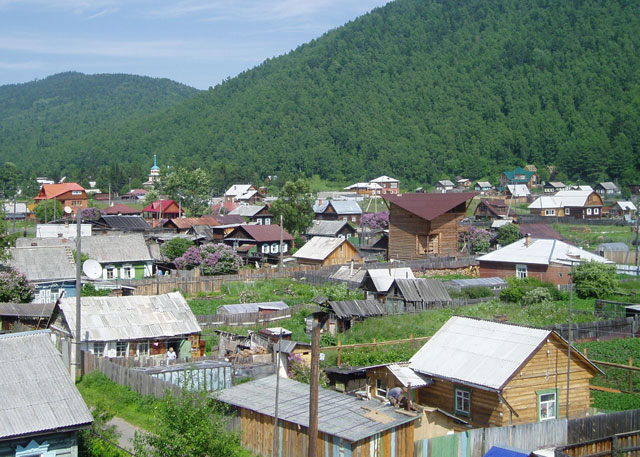
|
Listvyanka, a small town by Lake Baikal
|
Sunday 16th July
After breakfast at the hotel, we met Anya and were taken to the nearby
jetty for the ferry across the Angara River to Port Baikal. We had an hour or
so to look around Port Baikal, where there was a new wooden station building,
modelled on the original, containing a museum, shop and art gallery. The luxury
tourist train which we had seen in Krasnoyarsk was here, empty, its occupants
probably on a lake cruise.
We had included in our package a ride on the "Baikal Express" which
runs once or twice a week between Port Baikal and Irkutsk, and uses the original
section of the Trans-Siberian railway which runs alongside the lake, known as
the Circumbaikal Railway.
The train is an electric unit, which is dragged by a diesel locomotive on
the unelectrified branch line. The train was well-filled with Russian
holidaymakers, and it made a number of stops en route where passengers could
leave the train. At the first stop, Shumikha, most passengers left the train
and walked forward for about a kilometre, passing through a disused tunnel and
over a viaduct. The train then moved forward to pick everybody up. The second
stop, Polovinniy, was a 90-minute stop, allowing passengers to have lunch or
go for a swim. Anya took us to a café where we enjoyed a meal of borscht,
meat, omul and cheese, with a glass of cedarwood-flavoured vodka.
The train continued its slow journey along the lake shore, with two
more stops for photographs. Anya was a very good guide - friendly, informative,
and interested in us. She had brought some photographs of her home and family
to show us.
At Slyudyanka, the train reversed and took the modern Trans-Siberian main
line route, away from the lake, to Irkutsk. We arrived late in the evening,
and said goodbye to Anya, with an exchange of gifts, before being taken to the
Intourist Hotel.
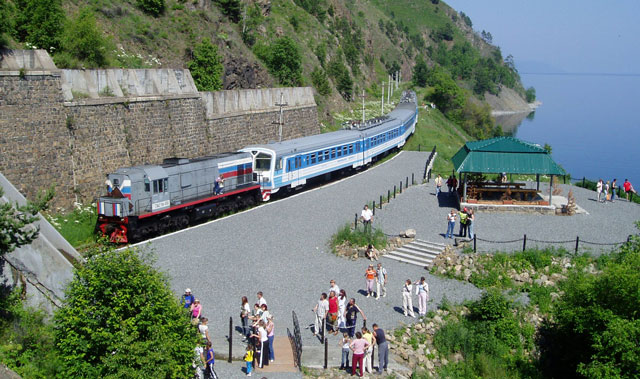
|
The "Baikal Express" tourist train on the original
route of the Trans-Siberian, alongside Lake Baikal. The station
is called Kirkirey.
|
Monday 17th July
We were up early to resume our eastward journey on the "Rossiya".
The stretch from Irkutsk to Vladivostok takes three days and nights.
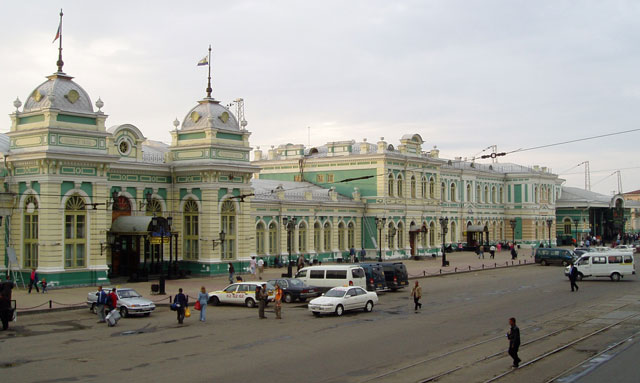
|
The frontage of Irkutsk station.
|
The day started cool and cloudy, with some rain. It was misty as we skirted
Lake Baikal, so there were no good views of the lake or of the mountains to
the south.
At Slyudyanka, people were selling smoked omul (fish) on the platform, so
we bought three (30 roubles each) and some rolls. The fish were delicious, eaten
while still warm. There were no packaged meals being handed out on this train,
but that was no great loss.
We soon settled back into the routine of life on board the train. Our
coach had two attendants: provodnitsa Yelena, and an older (male) provodnik
whose name we never learnt. I don't think we ever got a smile out of either
of them.
This part of the Trans-Siberian gets far fewer western tourists than the
more westerly part. There were two Italians, Francesca and Laura, in the next
compartment, and at dinner we met two Danes, Jens and Ashley. Jens told us that
he had cycled
across Russia in 1997, from Magadan on the Pacific to Kaliningrad on
the Baltic, and claims to be the first person to have done so.
Tuesday 18th July
Another day, and still more Siberia to traverse. We passed through no large
settlements at all today, but the train still makes long stops at certain stations
(Chernyshevsk-Zabaikalsk, Mogocha, Amazar) and a couple of short stops at even
smaller places.
We went to the restaurant car for breakfast for the first time. The menu
had "Fried eggs (not mixed)", so we each ordered that, along with
bread, cheese and tea. We each got three fried eggs, with bacon, which was a
pleasant surprise.
We skipped lunch, but bought ice creams during the afternoon station stop
at Mogocha. I had a "Dinka" (melon) ice cream; Bill and Tim had "Free
Love" ice cream. As usual, we also made sure we had sufficient stocks of
water and beer.
Two more firsts today: we failed to complete the crossword (from The Independent),
and we didn't have to put our watches forward.
At dinner, I wanted to try the "Soup: kharcho", but they didn't
have any, so again had the old favourite "Meet solianka (Soup with meet,
salty cucumbers, black olives, tomato paste, lemon and onion)". Main course
was pork.
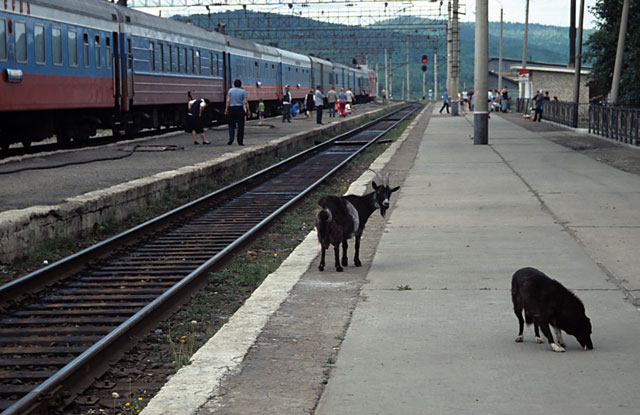
|
Amazar station in Eastern Siberia, complete with resident goat.
|
Wednesday 19th July
This was our last full day on this train, and by this time we were into the
Russian Far East. Our main station stops were Belogorsk, Obluche, Khabarovsk
and Vyazemskaya.
We had a disappointment at breakfast - they had no eggs. We made do with
orange juice, bread, cheese and tea. We bought bliny (pancakes) for lunch at
Obluche.
It got very hot on the train during the afternoon, as the air-conditioning
was not working on our coach. This had not been too much of a problem the previous
two days, as the weather had been cooler, but today was hot and sunny, and the
temperature reached 37 degrees in the corridor of the train. It was probably
even hotter in our compartment, but we were unable to remove the thermometer
from the wall of the corridor to confirm this.
I was beginning to get bored, and was glad it was the last day on this train.
We had our last meal on the train together with the Italian girls. My starter
was mushrooms & sour cream (very nice), and then I had the fried pork again
(the same item on the menu as yesterday, but presented differently today). After
dinner, Francesca helped us to negotiate the purchase of three of the glasses
with metal holders in which they serve tea on the train. The day finished with
a thunderstorm.

|
Obluche station. At most of the main station stops, enterprising
locals set up stalls selling food and drinks.
|
Thursday 20th July
We were awoken at 7 o'clock, and got our first view of the sea. We cleared
away the bedding and handed it to the provodnik, packed our bags and looked
out of the window until we arrived in Vladivostok, on time, at 8.24 local time
(1.24 Moscow Time).
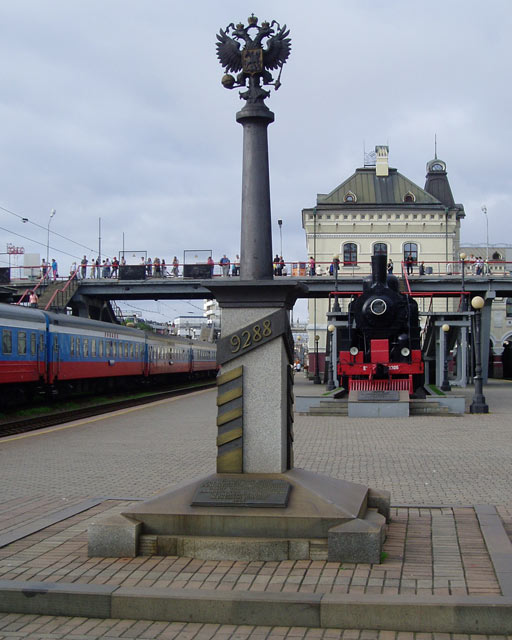
|
Journey's end for the "Rossiya": Vladivostok station.
This ornamental kilometre post indicates 9288km from Moscow.
|
 |
|  |
|  |
| 
 When we first boarded, the train was stiflingly hot, as it had clearly been
left in the sun without the air conditioning working. We dumped our luggage
in our compartment and returned to the platform. I went to a kiosk to stock
up on bottles of beer and water. The weekly Chinese train to Beijing was also
in the station, which brought back memories of 1997 for Bill and me. We re-boarded
our train, and it departed on time at 21.25. A packaged meal of burger, nibbed
wheat, sweetcorn and peas was handed to us shortly after departure, which we
weren't expecting. We ate it, despite not really being hungry. We stayed up
until the first locomotive change at Vladimir, just after midnight, where our
ChS7 class locomotive (3kV d.c.) was replaced by a ChS4T (25kV a.c.).
When we first boarded, the train was stiflingly hot, as it had clearly been
left in the sun without the air conditioning working. We dumped our luggage
in our compartment and returned to the platform. I went to a kiosk to stock
up on bottles of beer and water. The weekly Chinese train to Beijing was also
in the station, which brought back memories of 1997 for Bill and me. We re-boarded
our train, and it departed on time at 21.25. A packaged meal of burger, nibbed
wheat, sweetcorn and peas was handed to us shortly after departure, which we
weren't expecting. We ate it, despite not really being hungry. We stayed up
until the first locomotive change at Vladimir, just after midnight, where our
ChS7 class locomotive (3kV d.c.) was replaced by a ChS4T (25kV a.c.).








